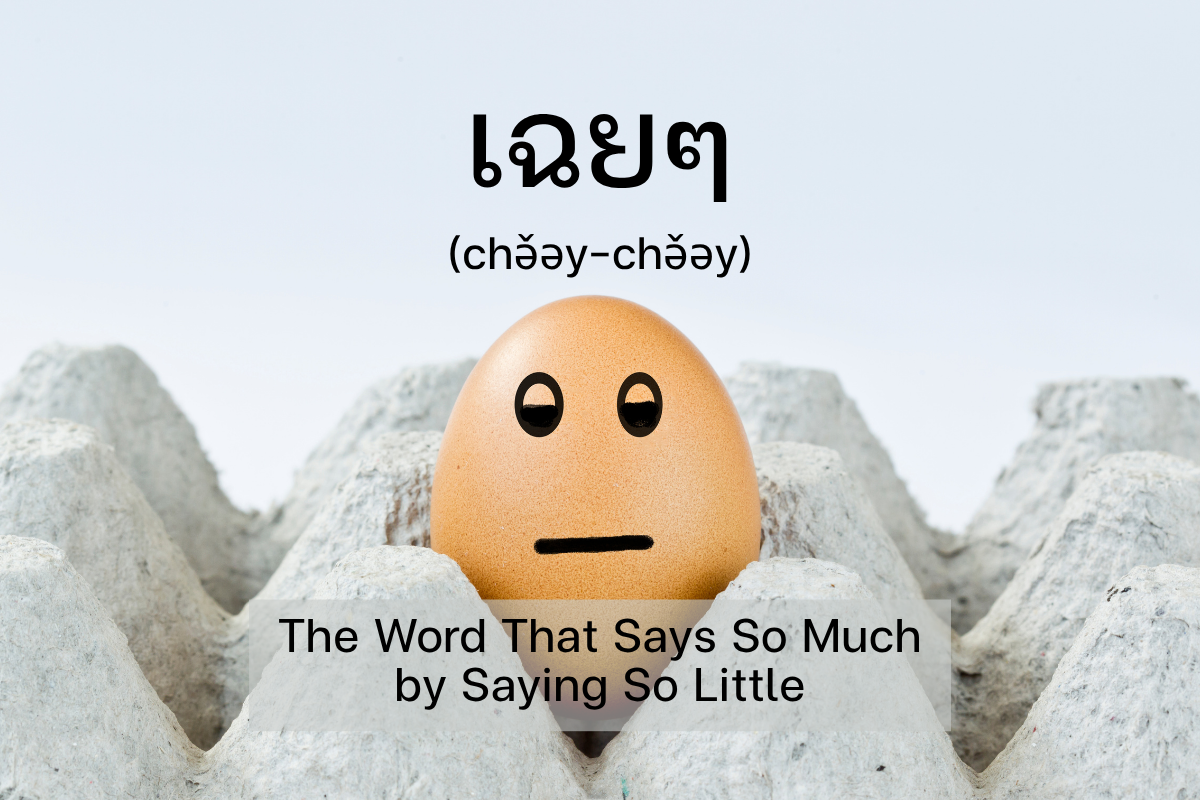As a Thai language learner, I guess you’ve likely come across the terms เฉย (chə̌əy) and เฉยๆ (chə̌əy-chə̌əy). These seemingly simple words are very versatile and can add significant nuance to your conversations.
In my latest podcast episode about การออกกำลังกาย (kaan ʔɔ̀ɔk-kamlaŋ-kaay), you will hear the phrase ‘นั่งเฉยๆ (nâŋ chə̌əy-chə̌əy)’, which means to just sit still and doing nothing.
But rather than just meaning ‘still’ or ‘indifferent,’ they can convey a range of emotions, from calmness to sarcasm.
Let’s explore the intriguing world of ‘เฉย (chə̌əy)’ and ‘เฉยๆ (chə̌əy-chə̌əy) and learn how to use them!
Table of Contents
What Does ‘เฉย (chə̌əy)’ mean?
The word เฉย (chə̌əy) alone means unresponsive or unmoved. It can be used as either a verb, an adjective, or an adverb. The practical example sentences below will help you understand this word better.
Examples,
ฉันบอกเขาแล้ว แต่เขาก็เฉย
(chán bɔ̀ɔk kháw lǽæw tæ̀æ kháw kɔ̂ chə̌əy.)
I told him already, but he still hasn’t responded.
ทำไมคุณถึงเฉยกับเรื่องนี้ได้
(thammay khun thɨ̌ŋ chə̌əy kàp rɨ̂aŋ níi dâay.)
Why can you be indifferent about this?
แม่ให้เขาไปอาบน้ำแต่เขายังนอนเฉย
(mæ̂æ hây kháw pay ʔàap-náam, tǽæ kháw yaŋ nɔɔn chə̌əy.)
Mom asked him to take a shower, but he was still lying down without moving.
แม้จะถูกว่า เขาก็ยังเฉย
(mǽæ ca thùuk wâa kháw kɔ̂ yaŋ chə̌əy.)
Even though he was criticized, he remained unfazed.
เขาเฉยไปแป๊บนึง ตอนได้ยินข่าวร้าย
(kháw chə̌əy pay pǽp-nɨŋ tɔɔn dâay-yin khàaw ráay.)
She was silent for a moment when she heard the bad news.
เขาทำหน้าเฉย
(kháw tham nâa chə̌əy.)
He made a blank face.
What Does ‘เฉยๆ (chə̌əy-chə̌əy)’ mean?
When you repeat the word เฉยๆ (chə̌əy-chə̌əy), it often changes the meaning based on the situation. It softens and broadens the definition to ‘just,’ ‘nothing special, or ‘without firm intention. ‘ It is used as an adjective or an adverb.
1. Just So-so, Nothing Special
This is one of the most common uses. When asked “How are you?” or “How was it?”, เฉยๆ (chə̌əy-chə̌əy) can be used to respond, which conveys the meaning of ‘so-so,’ ‘nothing special,’ ‘just okay,’ or ‘neutral.’
Examples,
A:
อาหารอร่อยไหม
(ʔaahǎan ʔarɔ̀y máy)
Was the food delicious?
B:
เฉยๆ ครับ/ค่ะ
(chə̌əy-chə̌əy khráp/khâ)
So-so.
A:
คุณรู้สึกยังไงกับหนังเรื่องนี้
(khun rúu-sɨ̀k yaŋŋay kàp nǎŋ rɨ̂aŋ níi)
How do you feel about this movie?
B:
ก็เฉยๆนะ
(kɔ̂ chə̌əy-chə̌əy ná)
It’s just okay / Meh.
A:
วันนี้เป็นยังไงบ้าง
(wan-níi pen yaŋŋay bâaŋ)
How was your day today?
B:
เฉยๆ ไม่ได้มีอะไรพิเศษ
(chə̌əy-chə̌əy, mây dâay mii ʔaray phísèet.)
Nothing special/Just normal.
A:
ชอบกรุงเทพฯ ไหม
(chɔ̂ɔp kruŋthêep máy)
Do you like Bangkok?
B:
เฉยๆ นะ ไม่ได้ชอบเป็นพิเศษ
(chə̌əy-chə̌əy ná, mây dâay chɔ̂ɔp pen phísèet.)
It’s okay. I don’t particularly like it.
2. Just, casually
Use the word เฉยๆ (chə̌əy-chə̌əy) with an action verb when you want to downplay an action or explain that there’s no deeper meaning behind what you’re doing.
Examples,
A:
ทำอะไรอยู่
(tham ʔaray yùu.)
What are you doing?
B:
ไม่ได้ทำอะไร แค่นั่งเฉยๆ
(mây dâay tham ʔaray. khæ̂æ nâŋ chə̌əy-chə̌əy.)
I’m not doing anything. Just sit.
A:
จะเดินไปไหน
(ca dəən pay nǎy.)
Where are you walking to?
B:
แค่เดินเล่นเฉยๆ
(khæ̂æ dəən lên chə̌əy-chə̌əy.)
I just take a walk.
A:
ทำไมถึงถามล่ะ
(thammay thɨ̌ŋ thǎam lâ.)
Why are you asking?
B:
ไม่มีอะไร แค่ถามเฉยๆ
(mây mii ʔaray khæ̂æ thǎam chə̌əy-chə̌əy.)
Nothing. I just ask.
A:
เมื่อเช้าไปไหนมา
(mɨ̂a-cháaw pay nǎy maa.)
Where have you been this morning?
B:
ไม่ได้ไปไหนนะ อยู่บ้านเฉยๆ
(mây dâay pay nǎy ná. yùu bâan chə̌əy-chə̌əy.)
I didn’t go anywhere. Just stay home.
A:
ชอบเขาหรอ
(chɔ̂ɔp kháw rɔ̌ɔ.)
Do you like him?
B:
เปล่า ไม่ได้ชอบ แค่คุยกันเฉยๆ
(plàaw, mây dâay chɔ̂ɔp. khæ̂æ khuy kan chə̌əy-chə̌əy.)
No, I don’t like him—just talking, that’s all.
3. indifferently, shamelessly, as if nothing happened
Indicates that someone acts as if nothing happened, even though they are not supposed to.
Examples,
เขาหยิบโทรศัพท์ของฉันไปเฉยๆ โดยไม่ขอ
(kháw yìp thoorasàp khɔ̌ɔŋ chán pay chə̌əy-chə̌əy dooy mây khɔ̌ɔ.)
She just took my phone without asking me.
เขาเหยียบเท้าผมแล้วเดินไปเฉยๆ ไม่ขอโทษสักคำ
(kháw yìap tháaw phǒm lǽæw dəən pay chə̌əy-chə̌əy. mây khɔ̌ɔthôot sák kham.)
He stepped on my foot and just walked away without saying a word of apology.
4. Quiet kind of person– personality
Used the word เฉยๆ (chə̌əy-chə̌əy) to describe the personality of a person who is not talkative or a quiet kind of person. It does not sound negative.
Examples,
A:
ทำไมพี่ชายคุณไม่ค่อยคุยกับใครเลย
(thammay phîi-chaay khun mây khɔ̂y khuy kàp khray ləəy.)
Why does your brother not really talk with anyone?
B:
อ๋อ …เขาเป็นคนเฉยๆ น่ะ
(ʔɔ̌ɔ… kháw pen khon chə̌əy-chə̌əy nâ.)
Ah, he’s just a quiet person.
5. Don’t move!
You can say เฉยๆ (chə̌əy-chə̌əy) as an imperative statement to ask someone to stay still or not move. You can also use it with a verb.
Examples,
Situation 1:
You see an aggressive-looking dog staring at your kid. You want her to stay still and not run away. So you can say,
อย่าขยับ เฉยๆ ไว้นะ
(yàa khayàp! chə̌əy-chə̌əy wáy ná.)
Don’t move! Just stay still.
Situation 2:
You tell your kid to stay still and not run around.
อยู่เฉยๆ นะ
(yùu chə̌əy-chə̌əy ná.)
Just stay still.
Tips: The meaning of ‘เฉย (chə̌əy)’ and ‘เฉยๆ (chə̌əy-chə̌əy)’ often depends significantly on the speaker’s tone of voice and facial expression. A flat, emotionless tone typically indicates indifference, while a light, casual tone suggests ‘just okay.’
Conclusion
Learning how to use ‘เฉย (chə̌əy)’ and ‘เฉยๆ (chə̌əy-chə̌əy) adds a subtle layer of fluency to your Thai. It helps you sound more natural and gives you a way to express a wide range of meanings—from apathy to casualness.
The key is to notice how Thai speakers use it in real life, and don’t be afraid to try it out in conversation.

